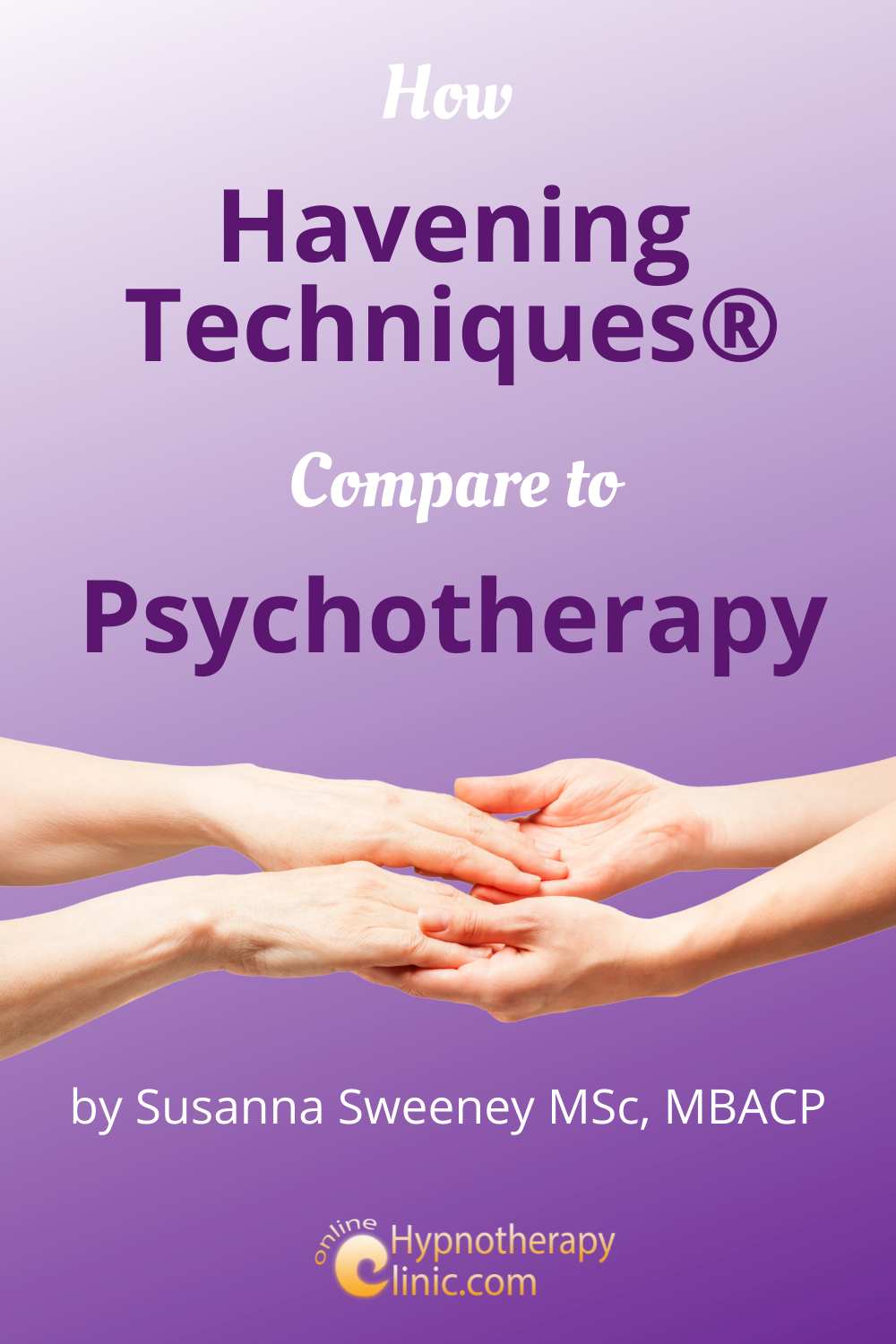Havening Therapy Compared to Psychotherapy
I want to compare Havening Therapy to psychotherapy in this article, because people continue to find it very difficult to understand often what the relatively novel Havening Techniques are all about.
I want to compare Havening Techniques to psychotherapy in this article, because people continue to find it very difficult to understand what the relatively novel Havening is all about. The text underneath is the video transcript.
Havening Therapy Compared to Psychotherapy
I will discuss how they each work, their strengths, the limitations, what the differences are, and what results you can expect from each. So I want to kick it off with this statement, everything has its place.
Both psychotherapy and Havening therapy have a very concrete function. One is not better than the other, but each serves a different purpose, which corresponds to the different stages of somebody's healing process.
To be very clear as well, Havening Techniques are NOT a psychotherapy system. Havening Techniques Training is a short training that does not necessarily make somebody a therapist, unless they have other training under their belt already.
What Havening Therapy and Psychotherapy Do
Psychotherapy and Havening techniques each work with different parts of the brain, so they do completely different things. By and large, we can argue that psychotherapy addresses primarily the cortex, which is home to rational thinking, home to ordinary memory. It's that outer layer of the brain.
Psychotherapy is a vast field and of course, it depends what kind of training somebody has in particular. There are some methods like Sensorymotor psychotherapy that I'm trained in, that dig that a little bit deeper into working with trauma symptoms through the body. But what's lacking there is an understanding of how exactly the brain actually works. And because it's still being addressed through talk, the cortex will always be the primary part of the brain that's active here.
Somebody might very well disagree with me, my opinion, it's based on my experience of working with trauma for the last over 25 years. Havening therapy in contrast address primarily the amygdale and also other parts of the limbic system that are associated with our survival responses with fight or flight, with fear with emotion.
One of the main functions of the limbic system is about survival. The memories that are encoded there are encoded there for a particular reason- to help us get through those difficult moments alive.
And when traumatically encoded memories are accumulated in there over a long period of time, that's when they start producing symptoms. And that's what Havening Techniques are targeting. They work with this particular mechanism and these particular difficult symptoms.
In psychotherapy, by and large, I think it's fair to say that when you are in psychotherapy, you very well may experience changes in the deeper layers of the brain, especially when you're working with a therapist who has specific training, maybe even around neuroscience, I don't know maybe that's available these days, maybe through Somatic Experiencing or Sensorymotor therapy.
But by and large, there is a lack in the psychotherapy world have tools for pursuing working with the deeper levels of the brain in a targeted way. While Havening therapy targets specifically those sites where traumatic memory is stored- so that we can convey a message to the brain that “it is safe now”, and hence we are able to change how memories (be they cognitive, emotional or somatosensory) are filed away in the brain. Namely, what we do is that we lower the priority at which these memories are filed. They very well may be filed in the cortex afterwards, as any ordinary memory would be when they are no longer deemed crucial to survival.
Psychotherapy, what are some of the strengths and what are some of the limitations? Psychotherapy is very useful when you really need to talk things through and it can often be useful in life to have a witness.
For some people, it is so important to tell their story maybe for the first time ever, and to have somebody who will validate their experience psychotherapy is also useful for reflection for developing self awareness, maybe an understanding of one's patterns or how one functions as a person.
And these are all things- I would say by and large take place in the early stages of someone's process as we start becoming curious about ourselves. And in those stages psychotherapy can be the perfect fit for someone.
Limitations of psychotherapy, I think with most psychotherapy approaches, it is fair to say that psychotherapy comes to the limits relatively quickly when it comes to intense emotions and disturbing symptoms.
And that will be the case in particular, when the training the person has lacks tools around supporting those. Unfortunately, that can create a scenario where people are left with a feeling of having stirred up material, and nothing has changed. Nothing has improved after those few sessions of therapy, and unfortunately, they feel too uncomfortable often to pursue psychotherapy long term.
When you are looking at outcomes in psychotherapy, you really are looking at having to pursue this process for a longish period of time, at least a year or two, until you can see substantial improvement. Then you can expect a better understanding of yourself of your history, you can expect clarity on your own patterns and your own issues. You can expect better coping skills, either in general or for specific situations.
And again, that's a very broad statement, it all depends on the particular training your psychotherapist will have. You can also if your therapist has the right training, expect some improvement with trauma symptoms, for example, toxic emotions may be reduced and intensity.
If that is the case, then you may very well experience more joy and more positive emotion and higher levels of resilience alongside there are some other trauma symptoms that in my experience are very difficult to change with psychotherapeutic tools alone. For example, chronic pain, migraines would fall into that bracket and some other somatic symptoms.
Strengths, Limitations and Expected Outcomes
For Havening therapy, what are some of the strengths and limitations? Well, you are looking at a change work modality here, you're not there to talk about your issues, you are there to use very particular tools in a facilitated session to make changes. And psychosensory means you're working with touch. So when I work with clients online, that will be a self applied touch. You can get relief from the disturbing symptoms that you're experiencing very, very quickly with Havening techniques in a short course of sessions.
Those changes will be permanent, and they happen really fast.
Havening is also very useful for resilience building. In fact, the toolkit contains particular tools for resilience building, we don't often use them with trauma work, but I certainly focus on them at the end of sessions and towards the end of someone's process.
As for limitations, if you are looking for psychotherapy and the support of a well trained and well experienced practitioner, then you will have to look for the particular combination of a psychotherapist is also a Havening Techniques practitioner.
They are two very separate trainings Havening is a short training, psychotherapy training can go on for years. The Havening toolkit does not contain self awareness tools. But self awareness tools of course can be used alongside- either plugged in to the process by a trained practitioner or you can use them at home on your own.
Expected outcomes- after a short program of Havening therapy it will be very reasonable to expect a substantial reduction in symptoms.
Symptoms like toxic emotions, chronic pain, addictions, low esteem, low confidence, anxiety, low mood, depression, and many other types of difficult to treat symptoms can change relatively quickly with Havening techniques. And as the symptoms are decreased in intensity, resilience will increase alongside and so will the positive emotions so things like joy, peace, excitement.
More About Havening
More About Havening
Havening und Havening Techniques Ausbildung auf Deutsch
Was ist Havening und wie könnte es Dir helfen, Dein Leben zu verändern?
Deutschsprachige Einführung zum Thema Havening.
Einführende Ausbildung in Havening Techniques®
Kostenfrei: zwei Stunden Videoinhalte für alle die neugierig sind.
Havening Techniques im Gespräch
Susanna Sweeney interviewt von Dr. Michelle Haintz. Wir reden über mein persönliches Erlebnis mit Havening, die Havening Methode und detailliert über die Havening Ausbildung.
Havening Interview zum Kennenlernen mit dem Klopftechnikverband (auf Deutsch)
Susanna Sweeney im Interview über die Havening Methode
Havening Techniques Interview (auf Deutsch)
Susanna Sweeney im Interview über die Havening Methode, die Havening Ausbildung und ihre eigene Reise mit Havening
Havening Techniques® Ausbildung auf Deutsch
Lernen Sie eines der modernsten und faszinierendsten Verfahren zur Auflösung von Traumasymptomen, Angstzuständen, chronischen Schmerzen und anderen Blockaden und zur Stärkung von inneren Ressourcen. Bequem von zu Hause- online.
Havening for Effective, Gentle and Permanent Change
What is Havening and how Could it Help you Change your Life?
This article gives a solid introduction to Havening that I recommend you read first.
Havening Touch- How to use it to Change your Life
Find out why Havening touch works so well and how to perform it at home to calm difficult emotions in minutes and build resilience.
Havening Therapy Compared to Psychotherapy
Find out how the lesser known Havening Techniques® compares to psychotherapy.
Dr. Ruden, Co-Creator of Havening in Interview with Susanna Sweeney discussing the history, philosophy and future of Havening Techniques.
Self Havening- How to use this Powerful Self Help Tool for Best Benefit
Find out how Self Havening could help you change your life for the better , and learn how to use it the right way so that you can get maximum benefit.
See the science and watch a client testimonial to see the amazing results Havening produces.
What is Havening? Find out about this cutting edge therapy modality that can help you with a vast range of issues including anxiety, low mood, low esteem, chronic pains, migraines and more
Havening Techniques- Interviews with the Founding Fathers
Meet Dr. Ron and Dr. Steve Ruden, founders of the Havening Techniques®, who- in two in-depth interviews, disclose the fascinating story of how this cutting edge psychosensory modality was developed.
I hope my article comparing Havening therapy to psychotherapy was helpful for you.
Let our community know what you've learned underneath.
Regards,

Recent Articles
-
Havening Technique Training auf Deutsch
Apr 18, 25 02:59 AM
Havening Technique Training auf Deutsch- Details und Buchung -
Client Testimonials
Oct 06, 23 06:08 AM
Client Testimonials of my Online REPAIRenting® Program that uses various psychosensory approaches for safe and quick transformation -
Smoke Free Thanks to This Amazing Resource
Aug 02, 23 09:26 AM
Oh thank you for this simple resolution to all my worries! I feel like I have had a weight lifted off my shoulders. It is like cheating on giving up smoking.


New! Comments
What do you think? Leave a comment in the box below.